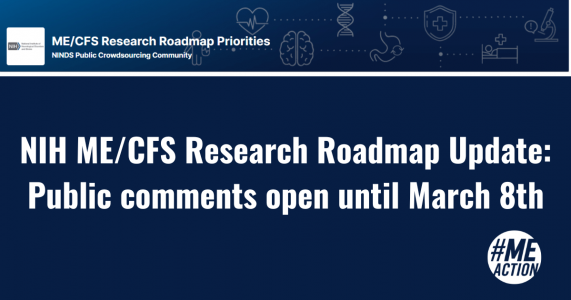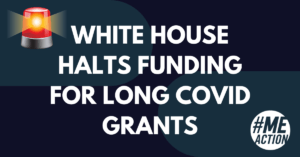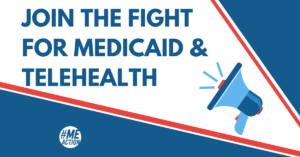The NIH ME/CFS Research Roadmap public comment period is open now with a deadline of March 8th.
#MEAction is a member of the ME/CFS Research Roadmap Working Group and for the past several months we have been advocating on behalf of this community within this group. Our Executive Director, Laurie Jones, served on the nervous system committee group prior to going out on maternity leave. She helped plan the first webinar and wrote drafts of research objectives with other committee members. Now our Scientific Director, Jaime Seltzer, is serving on this committee in the meantime.
Before each Roadmap webinar, we worked to ensure the community was informed so you could join the call or watch the recordings afterwards if able. Now we want to communicate how to participate in the public comment period as clearly as possibly for those who want to leave a comment.
Plus, we share a bit of the history of how we got to this point and where this working is leading us.
What Is the ME/CFS Research Roadmap?
“In 2019, the National Advisory Neurological Disorders and Stroke (NANDS) Council Working Group for myalgic encephalomyelitis/chronic fatigue syndrome (ME/CFS) presented the Report of the NANDS Council Working Group for ME/CFS Research. In 2022, as part of the strategic planning process outlined in the report, NINDS announced the development of a Research Roadmap for ME/CFS, which will identify research priorities to move the field toward translational studies and clinical trials”
Who is behind the roadmap?
The ME/CFS Research Roadmap Working Group of Council “ includes ME/CFS basic and clinical experts from the research community, leaders of ME/CFS non-profit advocacy and research organizations, as well as people with lived experience (i.e., individuals with ME/CFS, those with a family history of ME/CFS, caregivers/care partners, and/or patient advocates).” #MEAction participated in the working group. You can find the full list here: https://event.roseliassociates.com/me-cfs-research-roadmap/who-we-are/
What does it entail?
Working groups were formed to plan webinars. Eight webinars were held between August 2023 and January 2024. Each webinar addressed a specific research area. Each working group also provides a list of research priorities.
Now interested parties can provide feedback and comments on the research priorities that were developed during the discussions in each webinar. The feedback that is provided by the community on IdeaScale will be used to “finalize the research priorities that will be provided in a report to the NINDS Advisory Council and NINDS leadership on May 15, 2024.”
What research priorities were covered in the 8 webinars and where can I find them?
Nervous System, Immune System, Metabolism, Genomics/Genetic Susceptibility, Chronic Infection, Physiology, Less Studied Pathologies, and Circulation were the webinar topics
All webinars and transcripts: https://event.roseliassociates.com/me-cfs-research-roadmap/recordings/
I was unable to watch the webinar. Can I get a summary?
While we do not have a summary of each webinar, each working group for that particular research priority does provide a campaign brief on their about page. This can be a good place to start if you were unable to view the webinars.
HERE IS HOW TO PARTICIPATE:
You can now provide feedback and comments on the research priorities that were developed during the discussions in each webinar. The public comment period is now open and is scheduled to close on March 8, 2024. Comments will be weighed and considered in creating the final research roadmap.
The NIH encourages “stakeholders to review all of the priorities and comment on as few or as many as each individual or organization prefers. Comments may include input on how the draft research priorities could be enhanced, new research questions that could be included, or challenges that the current research priorities may face.”
PLEASE NOTE: Comments will be public so please do not include any personal and/or medical information.
There are two ways to participate. One is using IdeaScale and one is to email in your comments using certain parameters.
Option 1: IdeaScale
The NIH is using a crowdsourcing platform called IdeaScale. It allows you to comment and upvote other ideas on each different research priority area.
You can find a video on how to use IdeaScale here.
How do I comment:
- Start on this page.
- Log in if you want to add comments or feedback. No login is needed to review only. https://ninds.ideascalegov.com/a/community/login
- Now that you are logged in you will be taken to the community landing page. You should see the ME/CFS research roadmap page as well as the individual research priority pages.
- You will have to agree to terms of service agreement.
- You can view comments and add a reply or write a new comment.
Option 2: Email
If option 1 does not work for you, you can email the NIH your comments so they can add them for you. To do so, please include the information listed below and email them at mecfsresearchroadmap@ninds.nih.gov.
When you submit your feedback and comments via email, please let the NIH know these two things along with whatever comment or comments you are sharing:
- That you would like the NIH to post your feedback/comments on IdeaScale for you
- And whether you would like the NIH to post your feedback/comments anonymously or with your name. If you choose to post with your name, provide your full name.
Please send any questions about this process to the email address provided: mecfsresearchroadmap@ninds.nih.gov
What’s next?
March 4: NINDS will be hosting a webinar on March 4th from 11-12pm ET to provide updates on the ME/CFS Research Roadmap. Speakers will include Vicky Whittemore, Ph.D., NINDS program director; and Research Roadmap co-chairs Maureen Hansen, Ph.D., and Lucinda (Cindy) Bateman, M.D. Please register for the webinar in advance here.
March 8: End of public comment. The feedback that is provided by the community will be used to finalize the research priorities that will be provided in a report to the NINDS Advisory Council and NINDS leadership.
May 15- 16: The roadmap will be presented at the NANDS Council meeting on May 15-16, 2024.
All quotes are taken from the ME/CFS Research Roadmap communications and/or websites.





